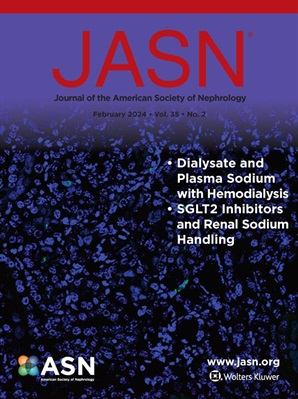在CKD和肾衰竭中,用ICD诊断代码识别心血管事件的准确性与医生判断的准确性。
IF 9.4
1区 医学
Q1 UROLOGY & NEPHROLOGY
引用次数: 0
摘要
背景:慢性肾脏疾病(CKD)患者心血管疾病的风险升高,心血管疾病事件是CKD研究中常见且重要的终点。中央委员会的裁决被认为是确定心血管疾病结果的最严格的方法,然而,它是资源密集型的。国际疾病分类(ICD)代码确定的结果与医生判定的CKD和肾衰竭心血管疾病事件的准确性相比,数据有限。方法:使用来自慢性肾功能不全队列的数据,我们评估CKD和肾衰竭参与者的住院事件,以确定ICD-9和icd - 10代码的准确性,并将其与医生判定的心血管疾病结局心衰、心肌梗死、中风和房颤进行比较。对于ICD代码,我们根据主要和次要诊断代码确定了每种心血管疾病结局的阳性预测值(PPV)、阴性预测值(NPV)、敏感性和特异性。已知心血管疾病危险因素与心血管疾病事件结果的关联被确定为ICD代码与医生裁决。结果:将3464名参与者的ICD-9或icd - 10出院代码与医生裁决进行比较,我们发现心衰患者的ppv为79%,心肌梗死为77%,缺血性卒中为77%,CKD和肾衰竭患者的房颤为85%。npv从94%到99%不等。特异性在99%到100%之间。敏感性要低得多,在15%到48%之间。心血管疾病危险因素与合并症(包括年龄、糖尿病、eGFR)之间的关联在ICD编码识别和医生判定识别的事件中相似,r值范围为0.82至0.98。结论与医生判断相比,原发性ICD诊断心力衰竭、心肌梗死、卒中和房颤的sppv接近80%,但敏感性较低。在医学研究中使用ICD代码可以在确定结果的有限资源下提高效率。本文章由计算机程序翻译,如有差异,请以英文原文为准。
Accuracy of Identification of Cardiovascular Events with ICD Diagnosis Codes versus Physician Adjudication in CKD and Kidney Failure.
BACKGROUND
The risk of cardiovascular disease is elevated in individuals with chronic kidney disease (CKD), and cardiovascular disease events are common and important end-points for research studies in CKD. Adjudication by a central committee is considered the most rigorous approach of ascertaining cardiovascular disease outcomes, however, it is resource intensive. There are limited data to determine the accuracy of International Classification of Diseases (ICD) code-ascertained outcomes compared to physician-adjudication for cardiovascular disease events in CKD and kidney failure.
METHODS
Using data from the Chronic Renal Insufficiency Cohort, we evaluated hospitalization events in participants with CKD and kidney failure to determine accuracy of ICD-9 and 10 codes compared to physician-adjudication of the cardiovascular disease outcomes heart failure, myocardial infarction, stroke, and atrial fibrillation. For ICD codes, we determined the positive predictive value (PPV), negative predictive value (NPV), sensitivity and specificity for each cardiovascular disease outcome based on primary as well as secondary diagnosis codes. Association of known cardiovascular disease risk factors with incident cardiovascular disease outcomes were determined for ICD codes vs. physician-adjudication.
RESULTS
Comparing primary ICD-9 or 10 discharge codes to physician-adjudication, for 3464 participants, we found PPVs of 79% for heart failure, 77% for myocardial infarction, 77% for ischemic stroke, and 85% for atrial fibrillation for individuals with CKD and kidney failure. NPVs ranged from 94% to 99%. Specificities were high at 99% to 100%. Sensitivities were much lower at 15% to 48%. The associations between cardiovascular disease risk factors and co-morbidities (including age, diabetes, eGFR) were similar for ICD code-identified and physician-adjudication identified events, with r-values ranging from 0.82 to 0.98.
CONCLUSIONS
PPV was near 80% for heart failure, myocardial infarction, stroke, and atrial fibrillation for primary ICD codes versus physician-adjudication, however sensitivity was lower. ICD code usage in medical research may allow greater efficiency with limited resources for outcome ascertainment.
求助全文
通过发布文献求助,成功后即可免费获取论文全文。
去求助
来源期刊
CiteScore
22.40
自引率
2.90%
发文量
492
审稿时长
3-8 weeks
期刊介绍:
The Journal of the American Society of Nephrology (JASN) stands as the preeminent kidney journal globally, offering an exceptional synthesis of cutting-edge basic research, clinical epidemiology, meta-analysis, and relevant editorial content. Representing a comprehensive resource, JASN encompasses clinical research, editorials distilling key findings, perspectives, and timely reviews.
Editorials are skillfully crafted to elucidate the essential insights of the parent article, while JASN actively encourages the submission of Letters to the Editor discussing recently published articles. The reviews featured in JASN are consistently erudite and comprehensive, providing thorough coverage of respective fields. Since its inception in July 1990, JASN has been a monthly publication.
JASN publishes original research reports and editorial content across a spectrum of basic and clinical science relevant to the broad discipline of nephrology. Topics covered include renal cell biology, developmental biology of the kidney, genetics of kidney disease, cell and transport physiology, hemodynamics and vascular regulation, mechanisms of blood pressure regulation, renal immunology, kidney pathology, pathophysiology of kidney diseases, nephrolithiasis, clinical nephrology (including dialysis and transplantation), and hypertension. Furthermore, articles addressing healthcare policy and care delivery issues relevant to nephrology are warmly welcomed.

 求助内容:
求助内容: 应助结果提醒方式:
应助结果提醒方式:


